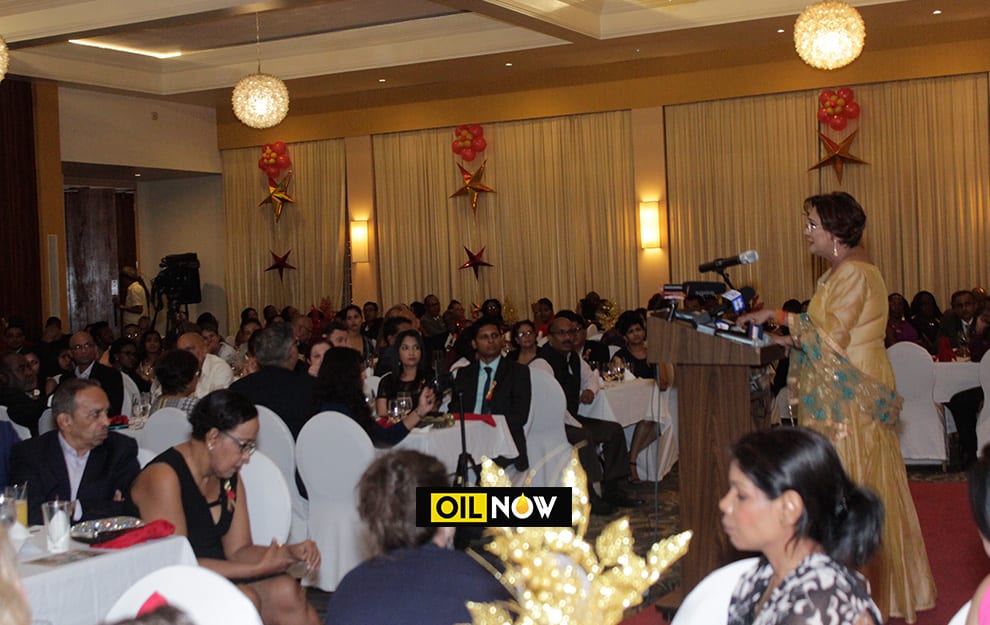Speaking to a room packed to capacity at the Pegasus Hotel in Georgetown, Guyana on Thursday evening, Trinidad and Tobago’s Opposition Leader and former Prime Minister, Kamla Persad-Bissassar urged Guyana to avoid some of the mistakes made by her country in the management of its petroleum resources.
Tracing back Trinidad’s history in oil and gas to the drilling of its first well in 1857, to its transition to becoming a major natural gas producer, Mrs Persad-Bissessar said, “As a young nation we had our challenges in managing the black gold from the earth; the harnessing and regulation of this precious resource and most important, in maximizing opportunities from the revenues garnered from the sale and processing of crude oil and the monetization of this resource.”
Reflecting on some of the mistakes the twin island republic has made in managing its petroleum assets, the Opposition Leader said she is embarrassed to be telling Guyanese what they should do when Trinidad has failed to sustain its own industry, referencing the recent closure of the Petrotrin refinery.
“I feel very sad…indeed I am very embarrassed to speak to you here in Guyana about the oil and gas sector given what is happening in my own country with our oil and gas sector,” she told those gathered for the Guyana Manufacturing and Services Association’s 23rd Annual Awards Presentation Dinner.
Energy Security
The former Prime Minister urged Guyanese to ensure that the country moves rapidly to energy security and independence, failure of which, she said, would be a significant mistake that could have long-term negative effects on the South American country.
“Guyana should above all other things, especially having been an importer of energy yourself for so long; you should work towards ensuring energy security and energy independence. We have just surrendered our energy security by the decisions taken with respect to Petrotrin. I urge you never to do that,” she stated.
750,000 barrels per day
Comparing Trinidad’s average daily oil production of 65,000 barrels with the estimated 750,000 barrels per day expected to come on stream by 2025 in Guyana, Mrs Persad-Bissessar said, “you are talking about Kuwait or Qatar. You’re talking about your small population of less than one million people. You are living in a place that has such tremendous potential,” she said.
How will Guyana spend its windfall?
This, the former Prime Minister said, is a major question that must be answered, not only by government, but by the entire population. She said her first recommendation would be that at the leadership governmental levels, a national vision is put forward for the improvement of the lives of all Guyanese.
“To this end I will recommend you develop a national policy for development of Guyana. What this means is all stakeholders; government, opposition, private sector, state sector, should sit now, if you’ve not yet done that, and get contributions from labour, civil society, business community…should be sitting like think tanks in a think tank now; develop a national policy for development of your country,” she stated.
A national policy on development, Mrs Persad-Bissessar stated, must be accompanied by robust legislation to allow for its implementation.
“Where you want to be seven generations down is not cursed by the black gold from your soil. You want to be where your economy is fully diversified and not dependent on just the oil and gas sector. That is one mistake we made in Trinidad and Tobago and today I am sure we regret – I certainly do regret that,” she pointed out.
Avoid the Resource Curse
The lucrative nature of the oil and gas sector makes it easy for everyone and everything to gravitate to it, thereby neglecting the other sectors, she said. The former Prime Minister urged Guyana not to fall victim to this but ensure from the outset that there is a strong programme focusing on diversification.
“You become an exporter of the black gold but then you become an importer of everything else,” she warned, adding that Trinidad and Tobago has been talking about diversification for years “but people never bothered because you’re making so much money from the hydrocarbon sector and now it will be perhaps too late, some will say and some will cry.”

Mrs Persad-Bissessar also highlighted the importance of having a Sovereign Wealth Fund operating under strict draw-down rules and legislation that would protect Guyana’s patrimony. Such legislation, she said, while robust, should not be onerous, bogged down by red tape so that it dissuades investors from plugging revenue into much needed projects.
Reflecting on when sugar was king in the Caribbean and raw materials were shipped out of the region, manufactured and then sold back to the people from whom it was taken, she warned, “you don’t want to end up into a different kind of slavery…don’t let that happen with your oil and gas. Yes, you will need the foreign investors, but you talked about local content, that’s a very important factor.”
All the operations in Trinidad at the beginning of its industry were foreign owned, she said, stating that the twin island republic now seems to be “going back to that. They are going to pull the crude out and export it, and what are we going to do? We now have to buy the things that we were producing…don’t let that happen to you, she told those gathered.”
Mrs Persad-Bissessar was the seventh Prime Minister of Trinidad and Tobago from May 26, 2010 to September 9, 2015. She was Trinidad and Tobago’s first female Prime Minister, Attorney General, and Leader of the Opposition.




Remember UWI Professor and professional Researcher, Dr. Roger Hosein? He has been uttering those same words, the same admonishments consistently at similar events here in Guyana since 2014/5. He apparently had been giving the very same advice and forecasts to the UNC in TT Government for 10 years but nobody was listening. Kamla came to give us the benefit of hindsight. Nice touch with the History lesson.